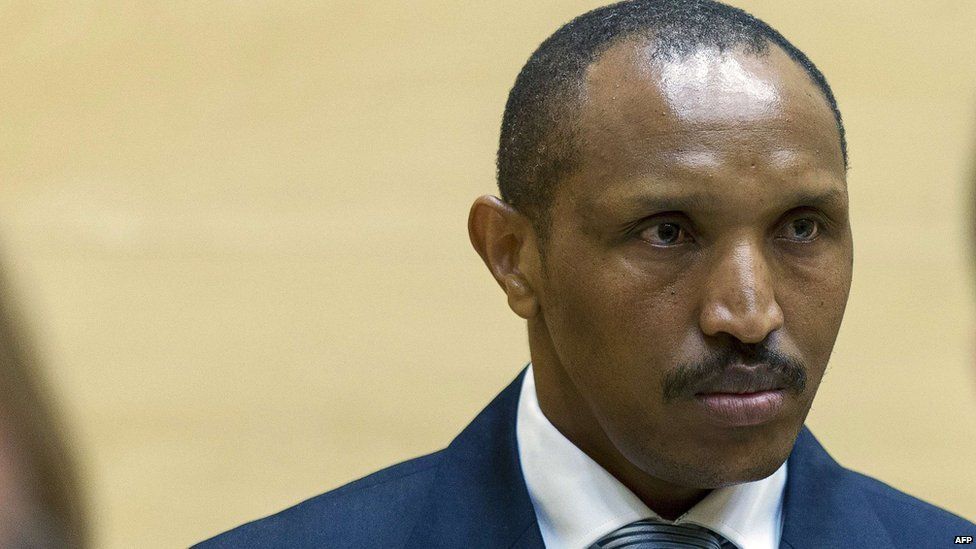DR Congo's Bosco Ntaganda pleads not guilty at ICC trial
- Published

Former Congolese rebel leader Bosco Ntaganda has pleaded not guilty to all charges at the start of his war crimes trial at the International Criminal Court (ICC) at The Hague.
The 18 charges include murder, rape and the recruitment of child soldiers.
Evidence has been gathered from more than 2,000 alleged victims, including former child soldiers.
Nicknamed "The Terminator", Gen Ntaganda's trial is the biggest and most complex case in the ICC's history.
He fought for different rebel groups as well as the Democratic Republic of Congo's army.
He made his not guilty plea in a barely audible voice, standing in the dock with his signature pencil moustache, reports the BBC's Anna Holligan from court.
The start of the trial was a historic moment for international justice and for the Democratic Republic of Congo, our correspondent adds.
The BBC's Anna Holligan: "Bosco Ntaganda founded the M23 rebel group"
The 41-year-old is accused of killing at least 800 civilians during separate attacks on a number of villages between 2002 and 2003.
He is also accused of raping girl soldiers and keeping them as sex slaves.
"Humanity demands justice for these crimes," ICC chief prosecutor Fatou Bensouda told the court.
Anna Holligan, BBC News, The Hague
The prosecutor used her opening statement to describe the experience of one witness in chilling detail. It was the aftermath of an attack on a village in the Ituri region of eastern DR Congo.
Ms Bensouda said the witness searched though a pile of bodies, and found his wife, toddler son and daughter, whose head was punctured and her throat slit. Then, he discovered his remaining two children who had been killed in the same way. He gathered the bodies of his family and buried them in a field.
According to the prosecutor, the rape and sexual enslavement of girls was so prevalent in Gen Ntaganda's Union of Congolese Patriots (UCP) rebel army, that girls were referred to as "a large communal cooking pot" - commanders, she alleged, could pass the girls around and use them for sex whenever they pleased.
Human rights groups here in The Hague have celebrated Gen Ntaganda's appearance, saying it is proof that even the most powerful leaders may one day be brought to justice.
In 2013, Gen Ntaganda handed himself in at the US embassy in the Rwandan capital, Kigali.
He had evaded capture for seven years after the ICC first issued warrants for his arrest.
Bosco Ntaganda was part of the UCP rebel group, led by Thomas Lubanga, who in 2014 became the first person to be convicted by the ICC.
Gen Ntaganda was one of the leaders of the M23 rebel movement, which had fought government troops until signing a peace deal in 2013.
Eastern DR Congo has suffered two decades of violence linked to ethnic rivalries and competition for control of the area's rich mineral resources.
Who is Bosco Ntaganda?
- Born in 1973 in Rwanda
- Fled to DR Congo as a teenager after attacks on fellow ethnic Tutsis
- At 17, he begins his fighting days - alternating between being a rebel and a soldier, in both Rwanda and DR Congo
- In 2006, indicted by the ICC for allegedly recruiting child soldiers in Ituri
- In 2009, he is integrated into the Congolese national army and made a general
- In 2012, he defects from the army, sparking a new rebellion which forces 800,000 from their homes
- In March 2013, hands himself in to US embassy in Kigali